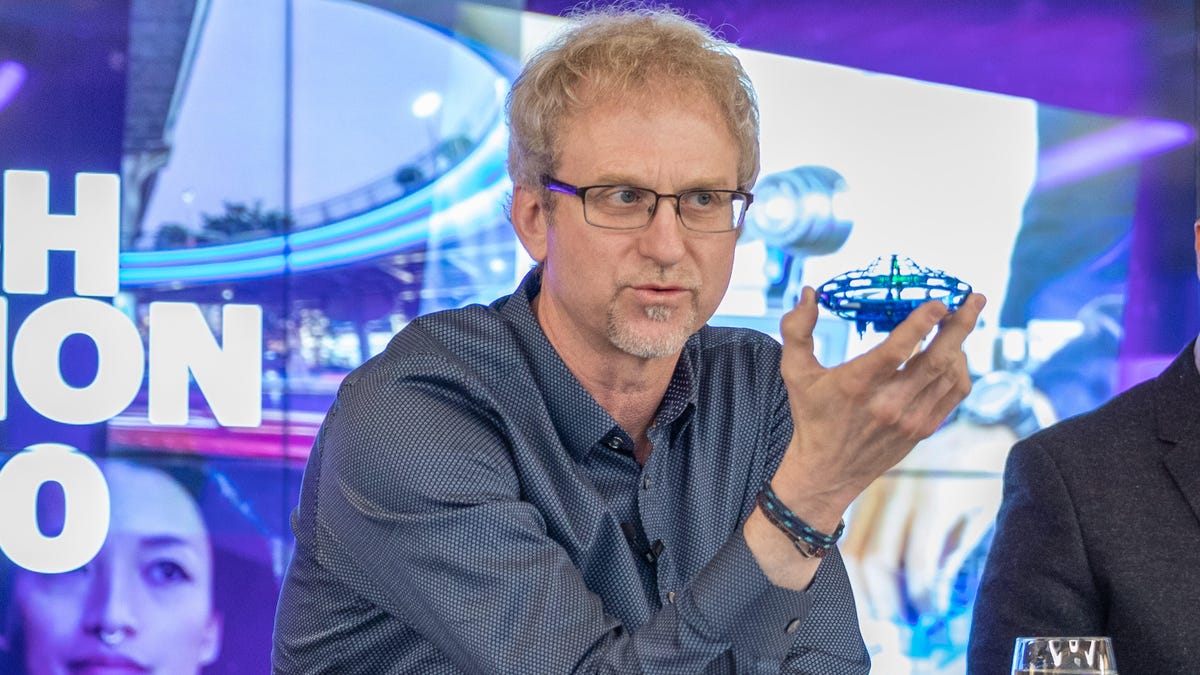Protect privacy or pay the price of consumer techlash, report warns
Accenture, an influential global consulting firm, says business success mustn't come at the expense of customers worrying about digital dystopia.

Accenture CTO Paul Daugherty holds a small drone to illustrate the pace of technological change.
For years, Accenture has promoted technology like artificial intelligence and big data as tools for big businesses to get ahead. Now the global consultancy says businesses have to protect consumer privacy from the technology Accenture has long advocated if they don't want to be struck by a growing backlash against that tech.
Businesses must ensure the technology that can mine personal data to find out what we might buy doesn't undermine the trust necessary for consumers to adopt new products and services that'll be deeply embedded in our lives. Without trust, people won't let a company deliver packages directly into their homes or rely on a company's self-driving car, said Paul Daugherty, leader of Accenture's technology and innovation work.
"Trust is the ultimate currency of the digital economy," Daugherty said at a press conference on Tuesday. "It's going to differentiate the winners and losers."
Daugherty's comments, which form the basis of Accenture's newest annual Technology Vision report, are significant in light of the company's role in the global business community. The consultancy, a goliath with 505,000 employees around the globe and $43 billion in 2019 revenue, advises 91 of the world's top 100 companies. It has long championed the adoption of technology to propel business performance and ensure shareholder happiness.
It isn't clear how much companies will be punished if they don't take Accenture's advice. Facebook, which profits from personal information used to target ads, continues to thrive despite problems like the Cambridge Analytica scandal. You may not like Amazon and Google prying into your doings, but their services make life a whole lot easier. And plenty of companies are insulated from public scorn because their business isn't with consumers -- though it still affects them. For example, Clearview AI makes facial recognition technology that could end anonymity when you're out in public.
Techlash and tech clash
A "techlash" -- a backlash against technology companies -- has sprung up as people bridle at problems like data breaches, privacy invasion, misinformation, incessant phone notifications, identity theft, election manipulations, robocalls, online hostility and jobs lost to automation.
In its report, Accenture offered a variation, "tech clash," to represent the fundamental conflicts that can exist between corporate success and customers' expectations. One key example of that "collision" is with privacy.
Privacy now matches computer security as a public concern, an Accenture survey concluded.
"Customers are growing hungry for more input on how their data is used, and many businesses lack the mechanisms to provide that," the report said. Customers don't like this, which is why we see regulations like the EU's General Data Protection Regulation and the newer California Consumer Privacy Act.
Companies have often escaped major repercussions from privacy encroachment and data-breach problems. But the public is getting more concerned, and Accenture sees privacy regulations as key to pushing companies in the right direction.
"We do need more consistent and strong privacy regulation that addresses the key principles," like your right to know what private information companies have about you and what they do with it and your right to make companies change or delete that information, Daughterty said.
Other 2020 tech trends
Accenture also predicted another range of tech trends for 2020:
The internet of things idea -- the spread of digital smarts far beyond just computers and phones into things like light bulbs and refrigerators -- means manufacturers hold a long-term responsibility for maintaining devices and have to find a way to pay for it. That's why companies are looking at services, not just products, for example with Philips selling lighting instead of light bulbs. "You fundamentally change the concept of ownership the moment you add this intelligence," said Michael Biltz, managing director of the Accenture Technology Vision project.
Artificial intelligence can be a tool to help employees, not replace them. For example, Volkswagen designed its new I.D. Buzz by letting an AI system generate lots of initial design ideas and explore new ways to make components lighter, but human engineers still were needed.
Robots are coming out of the factory floors and into our lives, for example with package delivery or hotel room service. "We're now seeing a world that's interacting with us," Blitz said.
Originally published Feb. 11.
Update, Feb. 12: Adds more detail about 2020 trends.

